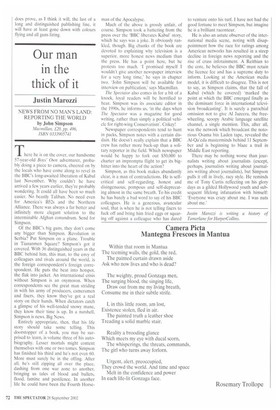Our man in the thick of it
Justin Marozzi
NEWS FROM NO MAN'S LAND: REPORTING THE WORLD by John Simpson Macmillan, £20. pp. 496, ISBN 0333905741 There he is on the cover, our handsome 57-year-old Boys' Own adventurer, probably doing a piece to camera, cheered on by the locals who have come along to revel in the BBC's long-awaited liberation of Kabul last November. Why couldn't he have arrived a few years earlier, they're probably wondering. It could all have been so much easier. No beastly Taliban. No need even for America's B52s and the Northern Alliance. There was always a far better and infinitely more elegant solution to the interminable Afghan conundrum. Send for Simpson.
Of the BBC's big guns, they don't come any bigger than Simpson. Revolution in Serbia? Put Simpson on a plane. Trouble in Tiananmen Square? Simpson's got it covered. With 36 distinguished years in the BBC behind him, this man, to the envy of colleagues and rivals around the world, is the foreign correspondent's foreign correspondent. He puts the heat into hotspot, the flak into jacket. An international crisis without Simpson is an oxymoron. When correspondents see the great man striding in with his army of producers, cameramen and fixers, they know they've got a real story on their hands. When dictators catch a glimpse of his well-tended snowy mane, they know their time is up. In a nutshell, Simpson is news. Big News.
Entirely appropriate, then, that his life story should take some telling. This doorstopper of a book, you may be surprised to learn, is volume three of his autobiography. Lesser mortals might content themselves with one or two tomes. Simpson has finished his third and he's not even 60. More must surely be in the offing. After all, he's still zipping all over the place, dashing from one war zone to another, bringing us tales of blood and bullets, flood, famine and pestilence. In another life he could have been the Fourth Horse man of the Apocalypse.
Much of the above is grossly unfair, of course. Simpson took a battering from the press over the 'BBC liberates Kabul' story, which he says was a joke. It obviously rankled, though. Big chunks of the book are devoted to explaining why television is a superior, more honest news medium than the press. He has a point here, but he protests too much. 1 promised myself I wouldn't give another newspaper interview for a very long time,' he says in chapter two. 'John Simpson will be available for interview on publication.' says Macmillan.
The Spectator also comes in for a bit of a knock, loyal readers will be horrified to hear. Simpson was its associate editor in the 1990s, he informs us, 'in the days when The Spectator was a magazine for good writing, rather than simply a political vehicle for right-wing Conservatism'. Crikey!
Newspaper correspondents tend to hunt in packs, Simpson notes with a certain disdain. He doesn't really explain that a BBC crew has rather more back-up than a solitary reporter in the field. Which newspaper would be happy to fork out $50.000 to charter an impromptu flight to get its bighitter into the heart of the action?
Simpson, as this book makes abundantly clear, is a man of contradictions. He is selfcritical and self-regarding, honest and disingenuous, pompous and self-deprecating almost in the same breath. To his credit he has barely a bad word to say of his BBC colleagues. He is a generous, avuncular soul, that is when he is not telling fixers to fuck off and bring him fried eggs or squaring off against a colleague who has dared
to venture onto his turf. I have not had the good fortune to meet Simpson, but imagine he is a brilliant raconteur.
He is also an astute observer of the international media scene, noting with disappointment how the race for ratings among American networks has resulted in a steep decline in foreign news reporting and the rise of crass infotainment. A Reithian to the core, he believes the BBC must retain the licence fee and has a supreme duty to inform. Looking at the American media model, it is difficult to disagree. This is not to say, as Simpson claims, that the fall of Kabul (which he covered) 'marked the point at which the BBC emerged finally as the dominant force in international television broadcasting'. It is surely a parochial omission not to give Al Jazeera, the freewheeling. scoopy Arabic language satellite channel, a single mention. This, after all, was the network which broadcast the notorious Osama bin Laden tape, revealed the Al-Qa'eda masterminds behind 11 September and is beginning to blaze a trail in Middle East reporting.
There may be nothing worse than journalists writing about journalists (except, perhaps, journalists writing about journalists writing about journalists), but Simpson pulls it off in lively, racy style. He reminds me of Tony Curtis reflecting on his glory days as a gilded Hollywood youth and subsequent lifelong infatuation with himself: 'Everyone was crazy about me. I was nuts about me.'
Justin Marozzi is writing a history of Tamerlane for HatperCollins.


































































































 Previous page
Previous page